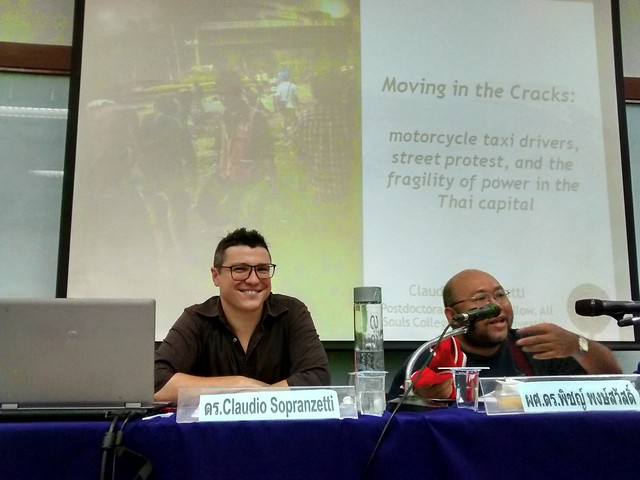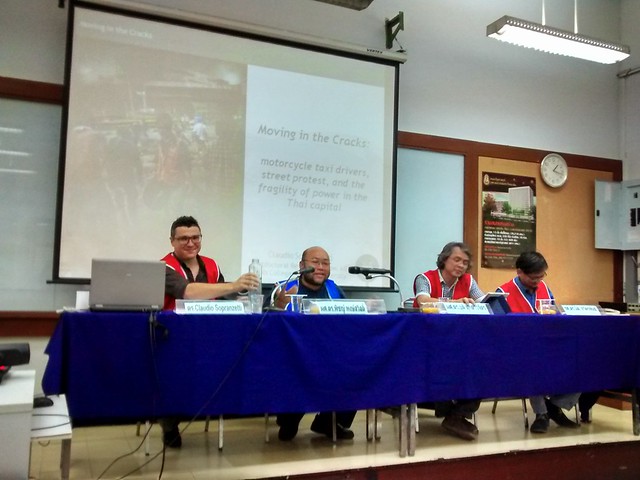Claudio Sopranzetti, an Italian visiting researcher at Chulalongkorn University, Bangkok, on Monday delivered a presentation "Moving in the cracks: Motorcycle taxi drivers, street protests and the fragility of power in the Thai capital” based on his doctoral dissertation in anthropology at Harvard. The research examines the role of motorcycle taxis in Thai politics and society and their role in the 2010 red-shirt mass demonstrations.
0000000
Dr. Claudio Sopranzetti and Asst. Prof. Pitch Pongsawat, the moderator
There are approximately 200,000 motorcycle taxis in Thailand, and on average, 4-6 million trips are made each day. Motorcycle taxis are nothing strange to those living in Thailand and they are instrumental in weaving cities together through incredible mobility. The motorcycle taxis’ “movement between the cracks” is both metaphorical and real: their mobility is not confined to the spaces on the roads, but also within the social hierarchy and economic classes. While they continue to zip through cracks in the traffic for a living, many of them zip through cracks of society, hoping to achieve a better life. Motorcycle taxi drivers represent a budding grass root political consciousness that challenges the weakness of state power.
Invisible mover of the city
Most motorcycle taxi drivers hail from rural parts of Thailand. Attracted by the glitz and glamour of Bangkok, they flock to the capital in search of work and possibility, a better life. Many start of by working in formal labor sectors, drawing measly salaries and working long hours. Fed up with constant exploitation, they quit and attempt to carve out a living in the informal sector. However, to believe that they are freed from the chains of exploitation would be a mistake- They continue to be trapped in a cycle of exploitation, “leaving them a few hundred baht in their pockets a day”.
Motorcycle taxi drivers develop relationships with people from other social classes through their role as connectors of the city. Though these relationships have the potential to transform into a path for social mobility through favor and patronage, they allow motorcycle taxi drivers to be aware of social inequality, opening their eyes to a lifestyle they could never afford. As they fulfill their role as connectors, motorcycle taxi drivers zip between spaces of wealth, only to realize what they are excluded from. This gives way to budding political consciousness as they begin to grasp the underpinnings of a larger political structure.
The panelists wear motorcycle taxi drivers' vests.
(From right) Assoc. Prof.Niti Pawakapan, anthropologist from Chulalongkorn University and Asst. Prof. Yukti Mukdawijitra, anthropologist from Thammasat University give comments after Sopranzetti's presentation.
Role in Red shirt protests
The rise of Thaksin Shinawatra and the ignition of “Entrepreneur Power” resounded deeply with motorcycle taxi drivers. They were starting to embrace the idea that they were the owners of their own businesses and that they deserved equal political rights with the city-folk in Bangkok. Thaksin did not gather their allegiance on purpose. It was a side effect of his capitalist strategy that coincided with a weakness of the Thai social fabric.
Motorcycle taxi drivers were instrumental in the 2010 red-shirt protests. Their mobility allowed them to rally information effectively and zip through throngs of people during the protests.
Challenging state power
The power of the state lies in its ability to maintain surveillance over its people. Motorcycle taxi drivers challenge the state’s power by being virtually invisible. Two dominant theories attempt to account for state power: Foucault’s argument that the ubiquity of power erases possibilities of emancipation and James Scott’s idea that state power is challenged by everyday actors. Both theories fall short in accounting for the 2010 red-shirt action.
This reveals that state power is fragile and has multiple caveats. An example would be the state’s lack of control over urban spaces. Motorcycle taxi drivers’ mastery of the urban jungle was an advantage during the 2010 protests. Although power is frayed and spread over a few weak spots, not all daily actions are capable of challenging the power apparatus. There exists a need to sift out weak spots to successfully challenge the establishment.
Nonetheless, the budding political consciousness has contributed to the success of the red-shirt movement. This is a threat to the traditional power apparatus and has revealed multiple fragilities of state power. The military government recognizes this weakness and has been acting on it recently.
What the 2014 coup means for them?
The junta has taken steps to centralize the organization of motorcycle taxis and to impose fare caps to clamp down on mafia influences. By doing away with the old administrative system, the junta hopes that motorcycle taxi drivers will no longer be exploited by influential personnel. As workers, this is good news for them. However, most motorcycle taxi drivers adopt a dual identity - the other being red-shirt activists. Accepting the arrangements of the junta is beneficial for them as workers, but not as red-shirt activists. There exists a conflict of interest as to which identity they should side with at this point in time.




